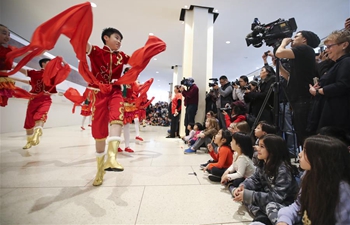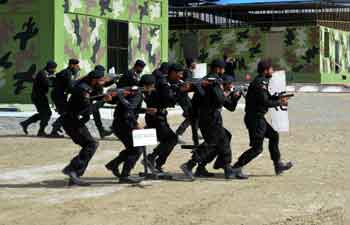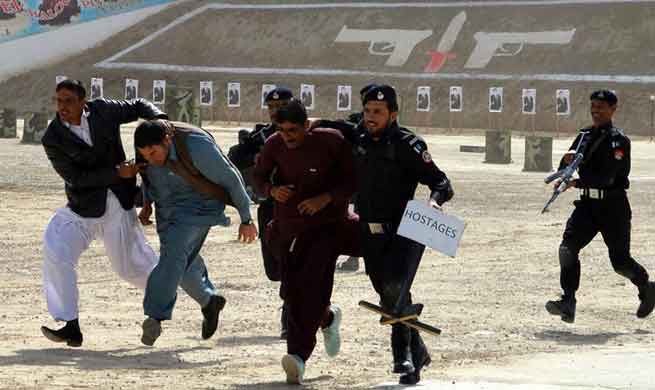DAMASCUS, Feb. 17 (Xinhua) -- As the Islamic State group lost most of their areas and strongholds in Syria, the prospect of peace in the war-torn country is still far way, because Syria is turning to be focus of military tussles by major and regional powers.
The situation in Syria has turned out to be more complicated than just defeating the IS group to end a crisis that will enter its eighth year.
Apparently, the Syrian war is no longer confined to a conflict between an opposition and a government, as the regional and international players have deeply involved militarily in the country.
Such a broader conflict is seen in northern Syria between Turkey and the United States, while in southern Syria the conflict is growing between Israel and Iran.
Tension has grown between the U.S. and Turkey, the two NATO allies, over the U.S.-backing of the Kurdish forces of the People's Protection Units (YPG) and their allies of the Syrian Democratic Forces (SDF).
Turkey deems the Kurdish forces in northern Syria as terrorists due to their links with the banned Kurdistan Workers Party (PKK) which has been fighting for autonomy in the southeast of Turkey.
Turkey launched a wide-scale offensive on the Kurdish-controlled Afrin enclave in northern Syria nearly a month ago to drive out the YPG from the area near the Turkish border.
Ankara also said it wants to launch an offensive on Manbij, another Kurdish-controlled area in northern Syria where the U.S. has a presence.
Gen. Joseph Votel, the U.S. Central Command chief, said on Jan. 29 that the U.S. is not going to pull out its forces from Manbij despite the Turkish threat to launch a military operation against the U.S.-backed SDF there.
Reports say the U.S. has about 2,000 troops deployed in northern Syria embedded with SDF units.
"The tension between the U.S. and Turkey will surely not develop into a war or military confrontation, but it will surely undermine the efforts to resolve the Syrian crisis," Maher Ihsan, a political analyst, told Xinhua.
On Friday, U.S. Secretary of State Rex Tillerson met with Turkish Foreign Minister Mevlut Cavusoglu in Ankara in attempts to defuse the tension between the two countries.
"We stand shoulder to shoulder with Turkey against terrorist threats and we salute our partnership with Turkey," Tillerson said in a reconciliatory tone.
"The relations with Turkey are not an alliance of convenience but a time-tested alliance," he added.
However, the U.S. official acknowledged that there is "a bit of crisis point in the relationship" with Turkey.
Following talks with Cavusoglu and Turkish President Recep Tayyip Erdogan, Tillerson said a working group to tackle the differences would meet by mid-March.
Despite efforts to avert a total breakdown over the Kurdish issue, their interests are conflicting in Syria and both seem unwilling to back off.
The U.S. has for long been backing the SDF in their fight in northern Syria, as the group and the YPG have proven reliable allies of Washington, at least in the face of the IS.
Late last year, the SDF fighters liberated the northern city of Raqqa, the de facto capital of the IS, from the terror group.
The Kurdish-led groups are also controlling some oil-rich areas on the eastern bank of Euphrates River in northern Syria.
"It's going to be hard for the U.S. to halt its support or alliance with Kurds in the area because the U.S. has already established military positions there and doesn't seem willing to leave anytime soon," Ihsan said.
Meanwhile, Ankara will not backdown on its determination to eliminate what Turkey perceives as a Kurdish threat in northern Syria, as it fears any separatist sentiment could inspire the 14 million Kurds inside Turkey, he noted.
On Friday, Hassan Nasrallah, the head of the Lebanese Hezbollah group fighting alongside the Syrian government forces in Syria, said in a televised speech that one of the aims of the U.S., through its presence in Syria, is the oil and gas fields in the northeast of the region.
"The American occupation of the territory east of the Euphrates remains, because there are oil and gas wells," he said.
Hezbollah, allied with Iran to support the government of President Bashar al-Assad, has sparked tension with Israel, which has repeatedly said it won't tolerate any Iranian influence in Syria, particularly in the southern region close to its border.
The Israelis have launched several airstrikes and missile attacks against Syrian military positions during the long-running war under the pretext that it was hitting weapons bound to Hezbollah.
Their recent attack was on Feb. 10, when Israel carried out attacks on Syrian military bases under the pretext that an Iranian drone was launched in Syria and infiltrated the Israeli airspace.
After hitting the an air base in central Syria, where the alleged Iranian drone station is located, the Syrian air defenses shot down an Israeli F-16 that was attacking the Syrian site.
Later on, Israel responded with a missile attack, targeting 12 military sites in Syria, including three alleged Iranian positions.
The Israeli warmongering rhetoric and actions are also another complication to the course of action in Syria, particularly now that the Syrian government pledged to immediately respond to any further aggression.
Additionally, tension also spiked between the U.S. and Russia, when Washington recently accused Moscow of protecting Assad from responsibility for what they said multiple chlorine gas attacks on civilians in recent weeks.
Russia and Syria denied the accusations, with government statements in Syria accusing Washington of creating pretexts to strike Syria.
The Syrian Foreign Ministry said earlier this month that the U.S. and its allies are "desperately" searching for a pretext to target Syria, following the success of the Syrian army in its war against terror-designated militant groups across the country.
Ahmad al-Ashqar, also a political expert, told Xinhua that tension between the regional and international players will negatively rebound on the efforts to resolve the conflict in Syria.
He mentioned the recent downing of a Russian warplane by Turkey-backed rebels in Idlib Province in northern Syria, and the downing of a Turkish helicopter by the Kurdish fighters in Afrin.
"We can see the clash of interests between the foreign players is more obvious this time as Syria's crisis is entering its eighth year," he said.

















